Native Ways to Say “How Was Your Day?” gives everyday conversations a fresh breath of life. The same daily check-in can become meaningful, supportive, and even fun—just by changing the words you use. Whether you’re texting a friend, leading a team, or talking to your partner, these emotionally intelligent phrases help build trust and connection.
Instead of repeating the same greeting, try alternatives that match the moment and mood. These creative prompts bring out stories, feelings, and even small wins. With real-life examples in texts, emails, and chats, this guide makes your conversations more human—and your bonds stronger.
How did today treat you?
Scenario (text to friend):
You: “Hey, Taylor—how did today treat you?”
Taylor: “It surprised me! The presentation went smoother than expected.”
This question is a warm emotional check-in question that rings more human than the usual. Sensitive and open-ended, it invites honest reflections and gently nudges meaningful exchange.
What did you get up to today?
Scenario (group chat):
You: “Hi, gang—what did you get up to today?”
Alex: “Tried a new recipe; it was a hit!”
This is one of the best informal conversation phrases and icebreaker questions. It’s light, curious, and perfect to start a daily check-in question.
Anything new or exciting happen today?
Scenario (work email):
Subject: Quick catch-up
Hi Leila,
Hope all is well—anything new or exciting happen today?
Best, Marcus
This phrase pulls out highlights. Combining optimism with curiosity, it works great for communication in therapy or personal check-ins.
How did everything go for you today?
Scenario (Slack message):
You: “Hey Ravi, how did everything go for you today after that long meeting?”
A solid professional conversation starter in workplace communication. Acknowledges effort and shows investment in their experiences.
Did today bring any surprises?
Scenario (family dinner):
You: “So, did today bring any surprises?”
Lefty: “Yes! I found a new trail on my commute.”
It adds a playful tone, helping grab attention and invite stories. Great for conversation variety.
Check out this: 22 Ways to Say “Enjoy Your Lunch”
How did you feel about today?
Scenario (supportive text):
You: “You seemed weighed down earlier. How did you feel about today?”
Sam: “It was tough, but I got to talk with my mentor. That helped.”
This is a deeper supportive communication phrase, ideal for communication in therapy or caring chats with friends.
Was today a good day for you?
Scenario (bedtime call):
You: “Before you sleep—was today a good day for you?”
Mom: “Mostly, yes. I cleaned the porch and read a chapter.”
A friendly check-in that caps the day on a thoughtful note. A solid day summary question with a nod to positive communication strategies.
What stood out for you today?
Scenario (mentoring email):
Subject: Mentoring Debrief
Hello Jade,
Loved hearing your updates. What stood out for you today from the workshop?
Warmly,
Coach Ben
This is an academic conversation phrase—sharp, reflective, and ideal for deeper dialogue.
Did you have a moment of peace today?
Scenario (text):
You: “Hey Lina, sounds hectic—did you have a moment of peace today?”
Lina: “Yes—a brief walk by the lake after work was just what I needed.”
A gentle supportive communication phrase, centered on personal well-being questions and mindfulness.
More for you: 27 Other Ways to Say “Enjoy Your Vacation”
How would you describe your day in three words?
Scenario (team-building chat):
You: “Ok, team—how would you describe your day in three words?”
Team: “Insightful, energetic, collaborative.”
A playful prompt that encourages reflection and sparks memory. Great for conversation starters and building bonds in informal or formal settings.
Was today better than yesterday?
Scenario (text to a friend post-low day):
You: “Hi Jon, I know yesterday was rough. Was today better than yesterday?”
Jon: “Somewhat—I got more restful sleep and actually had fun.”
A sensitive relationship-building question—it shows continuity and an authentic concern for moving forward emotionally.
What made you smile today?
Scenario (romantic morning text):
You: “Good morning Sophie—what made you smile today?”
Sophie: “Seeing a sunflower on my desk at school.”
A sweet romantic conversation prompt that invites warmth, closeness, and positivity.
Did you learn something new today?
Scenario (professor email):
Subject: Quick reflection
Hi Mia,
I enjoyed our session today—did you learn something new today?
Best,
Dr. Chan
This is a solid academic conversation phrase that encourages curiosity and growth.
For your interest: 19 Other Ways to Say “Can’t Wait”
How were your classes today?
Scenario (parent texting child):
You: “Hey Ethan, how were your classes today?”
Ethan: “Fun! We did a cool science demo.”
Simple and direct, it leans into parent-teacher communication style. A day summary with emotional engagement.
How did he/she do today?
Scenario (email from teacher to parent):
Subject: Update on Jordan
Dear Mrs. Patel,
Jordan shared great insights in our group today. How did he do today from your perspective?
Kind regards,
Ms. Riley
This variation suits parent-teacher communication, respectful and informative.
Were there any standout moments for my child today?
Scenario (evening phone call):
You: “Hi Mrs. Ortiz, I just wondered—were there any standout moments for my child today?”
Teacher: “Yes—during art class, she showed fantastic imagination.”
A kind and involved parent-teacher communication prompt. It helps build connection and trust.
Did today feel productive for you?
Scenario (colleague after deadline):
You: “Hey Mark, after that deadline—did today feel productive for you?”
Mark: “Absolutely—we cleared the backlog and set new goals.”
One of those solid professional conversation starters, drawing on workplace communication and goal reflection.
Did anything unexpected happen today?
Scenario (friend’s voice message):
You: “Jennifer—did anything unexpected happen today?”
Jennifer: “Yes, I ran into an old buddy at the cafe!”
A friendly icebreaker question that ensures conversation variety and delight.
What highlights from your day can you share?
Scenario (newsletter blurb):
Subject: Team Weekly Highlights
Team,
I’d love to hear them—what highlights from your day can you share?
Cheers,
Devin
This is a structured daily check-in question ideal for meetings or group updates. Shows care and clarity.
How’s your energy today?
Scenario (wellness group chat):
You: “Hey—all checked in? How’s your energy today?”
Group: “A bit low—hope to recharge tomorrow.”
A focused personal well-being question that’s perfect for mental wellness check-ins or informal chats.
Did you experience any kindness today?
Scenario (kindness forum thread):
You: “Hi all—did you experience any kindness today?”
User: “Yes, a stranger paid for my coffee this morning.”
A soft supportive communication phrase that centers positivity and awareness of human goodness.
You might also like: 20 Other Ways to Say “Thank You for Your Suggestion”
How did you manage your stress today?
Scenario (briefing email to team):
Subject: End‑of‑day check-in
Team,
After this week’s rollout—how did you manage your stress today? Any strategies that worked?
Thanks,
Sandra
A healthy initiative for wellness and positive communication strategies in workplace communication or therapy group.
Synonym Table: All Alternatives
| Expression | Context/Use |
|---|---|
| How did today treat you? | Casual/emotional check-in |
| What did you get up to today? | Informal/icebreaker |
| Anything new or exciting happen today? | Casual/enthusiastic |
| How did everything go for you today? | Professional/workplace |
| Did today bring any surprises? | Playful/curious |
| How did you feel about today? | Supportive/reflective |
| Was today a good day for you? | General/daily summary |
| What stood out for you today? | Academic/reflective |
| Did you have a moment of peace today? | Wellness/self-care |
| How would you describe your day in three words? | Creative/team-building |
| Was today better than yesterday? | Supportive/emotional progression |
| What made you smile today? | Romantic/positive |
| Did you learn something new today? | Academic/growth |
| How were your classes today? | Parent-teacher/student |
| How did he/she do today? | Parent-teacher |
| Were there any standout moments for my child today? | Parent-teacher/full nurturing |
| Did today feel productive for you? | Workplace goal- or result-focus |
| Did anything unexpected happen today? | Icebreaker/generic |
| What highlights from your day can you share? | Group/team updates or beyond |
| How’s your energy today? | Wellness/emotional check |
| Did you experience any kindness today? | Community/empathy check |
| How did you manage your stress today? | Workplace/wellness/STRESS management |
FAQs
What makes these alternatives better than just saying “How was your day?”
They offer more specificity, show genuine interest, and invite deeper or more thoughtful responses.
Can these prompts work in professional settings?
Yes, many are ideal for workplace communication, team check-ins, or mentoring conversations.
Are these phrases suitable for children or teens?
Absolutely—several prompts are simple, age-appropriate, and help kids express their day better.
How often should I change up the question I use?
Rotating them regularly keeps conversations fresh, engaging, and less predictable.
Do these alternatives help improve emotional intelligence?
Yes, using them boosts empathy, active listening, and emotional awareness in daily interactions.
Conclusion
Native Ways to Say “How Was Your Day?” helps turn ordinary talks into meaningful exchanges. These new phrases make people feel heard and cared for.
Whether it’s a supportive check-in or a light-hearted opener, using the right words can make a big difference. It’s not just about asking—it’s about connecting. Try a few and notice how it changes your conversations.

Zoey Alba is an experienced blogger and language enthusiast with a passion for helping readers master the art of grammar. With years of expertise in writing, editing, and content creation, Zoey shares practical tips and insightful advice to make grammar accessible for all. When she’s not writing, Zoey enjoys reading, learning new languages, and inspiring others to write with confidence.
